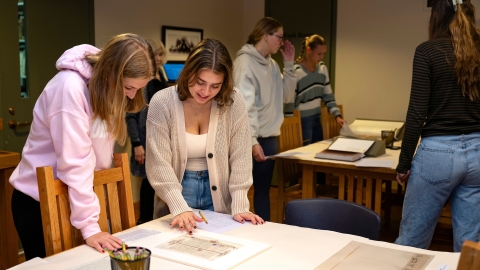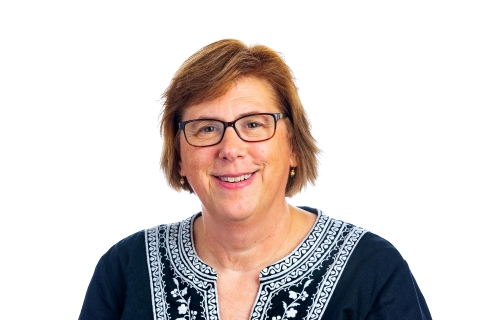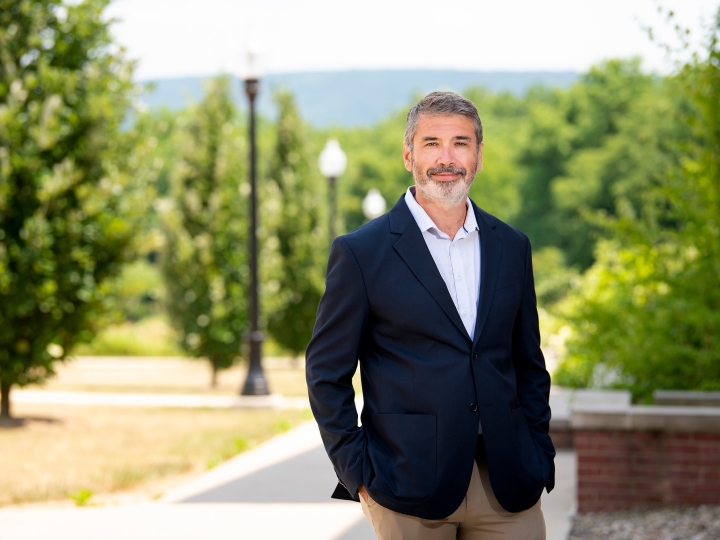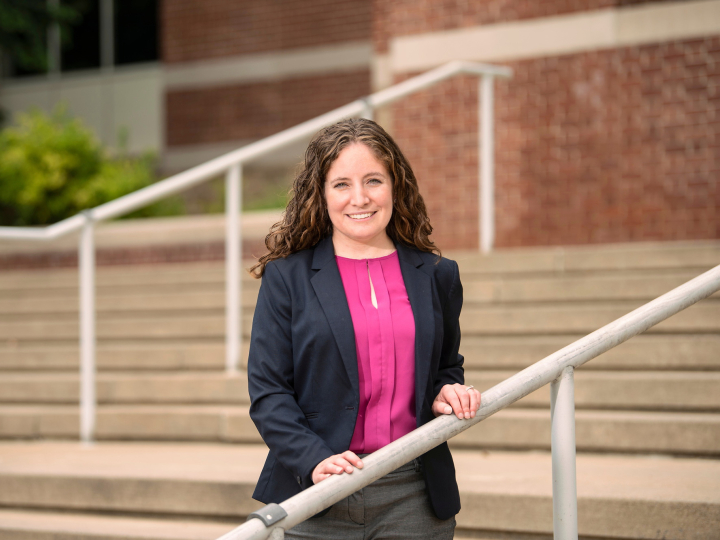
Bucknell Team Wins International Prize for Text Encoding Ingenuity
October 7, 2025
LEAF-Writer Commons assists researchers in preserving digital scholarly editions and collections, like these being reviewed by art history students. Photo by Emily Paine, Marketing & Communications
Bucknell University collaborators on LEAF-Writer Commons — a standalone semantic code editor and writing component of the Linked Editorial Academic Framework (LEAF) — were part of the team awarded the international 2025 Rahtz Prize for TEI Ingenuity. This annual award recognizes innovative and impactful contributions to digital scholarship through the use of Text Encoding Initiative (TEI) standards. Bucknell's LEAF project represents the first U.S.-based installation of the Linked Editorial Academic Framework virtual research environment.
LEAF-Writer Commons was developed in collaboration with the Collaboratory for Writing and Research on Culture (CWRC) and colleagues at Newcastle University in the United Kingdom. The platform assists researchers in producing, publishing and preserving digital scholarly editions and collections, providing a flexible, standards-driven environment for research and teaching.
A number of projects are using the LEAF-writer component, including:
- Suzette Numérique (Professor John Westbrook), a digital edition of a 19th-century French primary school textbook for girls
- The Heresies Project (Professor Roger Rothman, Professor Erica Delsandro, Diane Jakacki, digital scholarship coordinator), a preservation and research resource for the 20th-century second wave feminist journal Heresies
- The John F. Zeller Papers (Susan Falciani Maldonado, University archivist), a collection of the correspondence of John F. Zeller III, Class of 1941, professor, administrator and later acting president of the University
"Bucknell faculty have found the tool to be invaluable, and students partnering with faculty have presented work in LEAF at international conferences," says Katherine Furlong, dean of library services.
LEAF-Writer is freely available worldwide and supports a multitude of languages, including Arabic and Hebrew — a technically challenging feature that expands its accessibility. The platform is open-source, open-access and researcher-led, reflecting Bucknell's commitment to advancing knowledge for the public good. Already in use by research projects and in classrooms across South America, Europe and North America, the tool embodies the University's effort to merge the liberal arts with technology and innovation.
"We celebrate this recognition. It hits on our global reach, undergraduate research, faculty partnerships and innovative excellence," Furlong says. "This is international recognition for the reach of the work that we do right here at Bucknell."
The LEAF at Bucknell initiative is part of the Liberal Arts Based Digital Editions Publishing Cooperative (LAB Cooperative). It's funded by two grants from the Mellon Foundation in partnership with the National Historical Publications and Records Commission: a Digital Edition Publishing Cooperatives planning grant in 2018 and an implementation grant from 2020 to 2023.
The LAB Cooperative is committed to helping scholars and students learn and apply best practices for digital analysis, annotation and preservation; ensuring that digital content is produced responsibly and respectfully; and recognizing that scholarship is built through collaboration across disciplines and roles.
Bucknell student fellows, including current student Justin Verlin '27, computer science & engineering; and recent graduates Viveka Kurup '25, Rachel Milio '22, Jaehoon Pyon '23 and Rebecca Heintzelman '24 contributed to the development of the LEAF Turning Engine, a valuable feature that enhances the platform.

Diane Jakacki, digital scholarship coordinator, library services, is principal investigator on the project. Photo by Douglas Kilpatrick
"This award affirms the vision and collaboration behind LEAF-Writer, as well as the values of accessibility and sustainability at the heart of the LAB Cooperative," says Diane Jakacki, digital scholarship coordinator, library services, and principal investigator on the project. "It is especially meaningful to see our students' contributions acknowledged on the global stage, demonstrating that Bucknell undergraduates are helping to shape the future of digital scholarship.
"This is a wonderful achievement and demonstrates the value of researcher-led software development and the impact such tools can have to support scholars and students," she adds.

